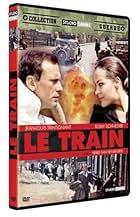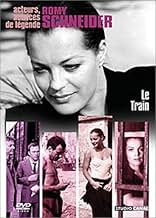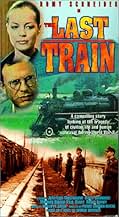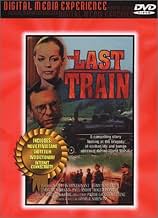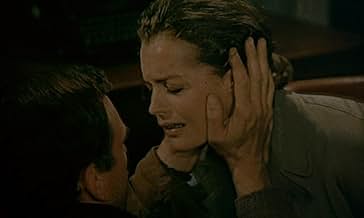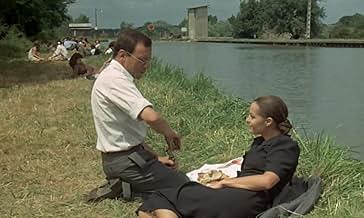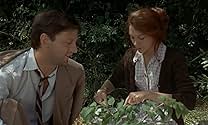VALUTAZIONE IMDb
6,9/10
1862
LA TUA VALUTAZIONE
Due persone, un francese e una tedesca ebrea, si sono incontrati su un treno mentre scappavano dall'esercito tedesco che entrava in Francia.Due persone, un francese e una tedesca ebrea, si sono incontrati su un treno mentre scappavano dall'esercito tedesco che entrava in Francia.Due persone, un francese e una tedesca ebrea, si sono incontrati su un treno mentre scappavano dall'esercito tedesco che entrava in Francia.
- Regia
- Sceneggiatura
- Star
- Premi
- 1 candidatura in totale
Recensioni in evidenza
The film is developed during the Lightning War(Blitzkrieg) a military tactics inaugurated by Hitler and carry out by such combat commanders as General Guderian, commanding the Panzers troops, in the French campaigns of 1940. The accent was no longer placed on endless columns of soldiers marching a few miles a day. Instead of the static lines Lightning War emphasized mobility and fluidity, destroying thousands of artillery pieces as well as several French infantry divisions.The enemy was slowed down by bombing from the air all his means of communications and transportation, trains, roads and the opposing air force was destroyed on the ground. The German regular infantry , foot soldiers and motor-drawn artillery were committed to mop up resistance and join up with advances forces. The French invasion is well reflected in documentary stuff added into the movie. French people attempt to flee by any means possibles, throwing the fugitives and defenders into hopeless confusion . A radio repairman named Julien(Jean Louis Trintignant ) aboard a train with his pregnant spouse and kid. But he's placed in cattle wagon and his family in passengers cars . There Julien knows Jewish-German woman named Anna(Romy Schneider),and falls in love with her.Furthermore they befriend to remainder passengers(Regina,Serge Marquand, among others).
This is an interesting drama/war developed in a French train during the 40s and based on novel by George Simenon,'Inspector Maigret's author'.It's the feeling story about a doomed love with sweet moments and sad ending with fateful destination. Extraordinaries performances from duo protagonist, as Jean Louis Trintignant as insignificant father of family turned into enamored and Jewish saving, and an enjoyable Romy Schneider as long-suffering Jewish turned into Resistance fighter. Colorful cinematography by Walter Wottitz who also photographed 'The train' by John Frankenheimer. Emotive and atmospheric musical score by Philippe Sarde. The motion picture is well directed by Pierre Granier-Deferre who added extensive documentary footage. Writer and filmmaker Pierre Granier directed to French all-stars, Jean Louis Trintignant, Alain Delon but specially worked with Jean Gabin and Lino Ventura ; and again directed to Romy Schneider in 'A woman at her window' . Rating : Better than average.
This is an interesting drama/war developed in a French train during the 40s and based on novel by George Simenon,'Inspector Maigret's author'.It's the feeling story about a doomed love with sweet moments and sad ending with fateful destination. Extraordinaries performances from duo protagonist, as Jean Louis Trintignant as insignificant father of family turned into enamored and Jewish saving, and an enjoyable Romy Schneider as long-suffering Jewish turned into Resistance fighter. Colorful cinematography by Walter Wottitz who also photographed 'The train' by John Frankenheimer. Emotive and atmospheric musical score by Philippe Sarde. The motion picture is well directed by Pierre Granier-Deferre who added extensive documentary footage. Writer and filmmaker Pierre Granier directed to French all-stars, Jean Louis Trintignant, Alain Delon but specially worked with Jean Gabin and Lino Ventura ; and again directed to Romy Schneider in 'A woman at her window' . Rating : Better than average.
Le train, directed by Pierre Granier-Deferre, is one of the most unknown WWII films ever made, even though it is based on a somewhat famous novel by Georges Simenon. However, Deferre wasn't interested in making a loyal adaption and especially the end differs from the original story a lot. Therefore, Deferre faced criticism and his film has sunk into oblivion, or at least in most cases, for it still has an honorable cast: Jean-Louis Trintignant (who has worked with Krzysztof Kieslowski, Francois Truffaut, Eric Rohmer and Bernardo Bertolucci), Romy Schneider (who had worked with Luchino Visconti and Orson Welles), in the leading roles; and one name worth mentioning is, as a supporting actress: Anne Wiazemsky (who has worked with Robert Bresson and Jean-Luc Godard, just to name a few).
The story starts from the summer of 1940 when a French man, Julien must leave his hometown, by train, with his wife and daughter because of the forthcoming Nazi army. In the train, Julien's wife and daughter are put to a carriage which is reserved for women, children and the elderly. In the result of this, Julien must go alone to the last carriage where he meets a group of people and notes a mysterious, Jewish German woman, Anna -- wonderfully interpreted by Romy Schneider. The film mainly focuses on their relationship and the journey to the unknown from the perspective of the last carriage.
It is a certain road-movie about a train travel during which people steal food, wash up and go to picnics. To observe war, from the perspective of a train and its people, is extremely intriguing, to say the least. For isn't train truly the milieu of our subconsciousness? In the train, our heroes are traveling to their indeterminate tragic destination, characterized by a wistful musical score. The essential idiocy of war is most clearly seen in a scene, where a group of soldiers come rampaging to the train and only succeed to, accidentally, shoot their own soldier's foot.
Le train depicts an escape from occupied France where, in turn, Francois Truffaut's The Last Metro depicts the survival and life in the occupied France. However, the connection between these two titles is entirely unintentional. The biggest flaws of Le train are in its conventional dramaturgy but it still manages to be an original film. The detailed cinematography is almost documentary-like with close-ups of train tracks; scenes of sexual intercourse, eating and washing up. Furthermore, the strength of the film is in the director's luminous idealism and faith in the force of love.
The film uses both newsreel footage and dramatizations; combines fact and fiction, like all historical films and throws the reality of war in front of our eyes. This combination means strong signal of memory; and the eternal relation between past and presence. History has always been an inexhaustible source of political rhetoric and Le train is, in fact, a leftist war film but, what is more, it achieves to relay a timeless and universal emotion of a time when man must lose his humanity, in order to survive. During times like this, moments of child-like joy are brief and transient. During times like this, it is important to love -- which might just be the thesis of this bittersweet film.
The story starts from the summer of 1940 when a French man, Julien must leave his hometown, by train, with his wife and daughter because of the forthcoming Nazi army. In the train, Julien's wife and daughter are put to a carriage which is reserved for women, children and the elderly. In the result of this, Julien must go alone to the last carriage where he meets a group of people and notes a mysterious, Jewish German woman, Anna -- wonderfully interpreted by Romy Schneider. The film mainly focuses on their relationship and the journey to the unknown from the perspective of the last carriage.
It is a certain road-movie about a train travel during which people steal food, wash up and go to picnics. To observe war, from the perspective of a train and its people, is extremely intriguing, to say the least. For isn't train truly the milieu of our subconsciousness? In the train, our heroes are traveling to their indeterminate tragic destination, characterized by a wistful musical score. The essential idiocy of war is most clearly seen in a scene, where a group of soldiers come rampaging to the train and only succeed to, accidentally, shoot their own soldier's foot.
Le train depicts an escape from occupied France where, in turn, Francois Truffaut's The Last Metro depicts the survival and life in the occupied France. However, the connection between these two titles is entirely unintentional. The biggest flaws of Le train are in its conventional dramaturgy but it still manages to be an original film. The detailed cinematography is almost documentary-like with close-ups of train tracks; scenes of sexual intercourse, eating and washing up. Furthermore, the strength of the film is in the director's luminous idealism and faith in the force of love.
The film uses both newsreel footage and dramatizations; combines fact and fiction, like all historical films and throws the reality of war in front of our eyes. This combination means strong signal of memory; and the eternal relation between past and presence. History has always been an inexhaustible source of political rhetoric and Le train is, in fact, a leftist war film but, what is more, it achieves to relay a timeless and universal emotion of a time when man must lose his humanity, in order to survive. During times like this, moments of child-like joy are brief and transient. During times like this, it is important to love -- which might just be the thesis of this bittersweet film.
France during 1940 to 1943 as seen by the acute observer Georges Simenon, an author who wrote the Maigret series, admired for his penetrating insights into the traditional lives of the French. It should be remembered by non-French viewers, that the French remember their dead from The Great War (WW1) on crosses and plaques in almost every village in France. (America came to understand this on 9/11, though only three places were hit.) Also that WW1 was fought on French soil. Twenty years later they are invaded again. (Maybe they should be blamed for that because of their vengeful Versaille Treaty.) Remember also that President de Gaulle (centre right) and President Mitterand (socialist) refused to take up the accusations of France caving into Hitlers demands and becoming a puppet regime under the name of Vichy which incorporated into its own laws the Nazi anti-Jewish programs. Against this essential background, there are two of Europe's most subtle actors, Jean-Louis Trintignant and Romy Scheider, who give a haunting performance of pathos and love. They flee by a "last" train northern France in 1940, before Paris falls, to the west coast La Rochell (incidentally, the town to be the German submarine base dramatically filmed in Das Boot). Trintignant with other men and unaccompanied women have to make do in a wagon for horses. This is a significant image. Other important images are the changing countryside, the generosity of the French, the first criminal acts of war of Luftwaffe planes shooting on civilians. Trintignant shows kindness, consideration and courage in protecting Romy Schneider. The rhythm begins to liken Ravel's Bolero: he is traditional parochial French, married with children (who are in the train's better compartments), he is inexperienced with other women, ignorant of world events, so he reflects the very subdued key of the beginning of Bolero; she is a German Jew, internationally experienced, knows men, has the instinct of survival. She adds to the sharper tones in Bolero. Their relationship develops in the wagon. He is more careful to transgress marriage boundaries, she does not want to comprise him, but both slowly are drawn to each other in the steady mounting Bolera rhythm. In the wagon, others engage in sexual intercourse and soon she realizes that she must make the first move. She understands that life is to be lived each minute and so their growing love, reaching new rhythmic heights, is consummated. All is natural, natural as horses in a wagon. No morality, no anglo-saxon prudery, just natural, as one understands this on continental Europe and in the East. The bolera rhythm reaches its climax in the last minutes. Three years he has not seen her. When he was reunited with his wife and new born child in La Rochelle she on her own accord left unseen. He is called to the French National Police. The French police worked in close agreement with the Gestapo (the security police arm of the Nazi Party) and just this aspect so ignored by Presidents de Gaulle and Mitterand is where author Georges Simenon subtedly puts in the knife. At the interview, he is confronted with her, arrested for being a Jew with the French Resistance. He denies the French Secret Service Police inspector's questions, but when she is brought in, the climax and (the Boleros crescendo) is released: the last scene is so powerful, love, the essence of life, is dealt doom. Essential to see, for so many lived that life!
... one of Hollywood's favourite blends. Luckily, this is not a Hollywood movie but a french one; luckily, its bitter realism wins over the sweet moving moments in one of the best-acted cinematic love stories ever. Romy Schneider and J.-L. Trintignant give a performance you won't forget even when you have forgotten most details and plot elements of this simple, but convincing film.
In th seventies,Granier-Deferre became the "cinema De Qualité " director par excellence ;more accessible and less pretentious than Claude Sautet after "Max Et Les Ferrailleurs " ,his career really began in the early sixties with two estimable movies with Jean Gabin ("La Horse" and "Le Chat"),he continued with craftsman works such as "La Veuve Couderc" or "Le Train" ,both Georges Simenon's books transferred to the screen.
It may explain the "detective story" ending,which may seem a bit irrelevant in a realistic movie,but it is saved by the talent of the two principals,Schneider and Trintignant,injecting more emotion into the scene than you might think possible.
This is an apt title,for most of the movie takes place on a train,a train full of people running away from the German armies in 1940 (the beginning recalls René Clément's "Jeux Interdits" (1952).The screenwriters made no bones about criticizing French cowardliness and selfishness;it was before "Lacombe Lucien" to be precise ;As the character played by Maurice Biraud remarks :"we're afraid,we are fleeing,so we don't fight each other,get it?" On the train,the characters are stereotypes,particularly the hooker played by Regine ,probably inspired by Maupassant's "Boule De Suif",the unwed mother (oddly portrayed by cerebral (who said tedious?) Anne Wiazemsky,two sex maniacs ("when I look at you (the whore),I look like a beast !- even when you don't!);the Jewish German (Schneider),the average man (Trintignant).
An user complained that this man in the street should leave his pregnant wife and his little girl for a while and sleep with the German woman:in a world gone mad,anything can happen ,it would never have happened,had this electrician continued his routine life .
Following René Clément's steps in "Jeux Interdits" ,GD smartly integrates black and white archives films which ,with a careful editing ,turn color when the director returns to his fiction.Which his predecessor was not able to do.
It may explain the "detective story" ending,which may seem a bit irrelevant in a realistic movie,but it is saved by the talent of the two principals,Schneider and Trintignant,injecting more emotion into the scene than you might think possible.
This is an apt title,for most of the movie takes place on a train,a train full of people running away from the German armies in 1940 (the beginning recalls René Clément's "Jeux Interdits" (1952).The screenwriters made no bones about criticizing French cowardliness and selfishness;it was before "Lacombe Lucien" to be precise ;As the character played by Maurice Biraud remarks :"we're afraid,we are fleeing,so we don't fight each other,get it?" On the train,the characters are stereotypes,particularly the hooker played by Regine ,probably inspired by Maupassant's "Boule De Suif",the unwed mother (oddly portrayed by cerebral (who said tedious?) Anne Wiazemsky,two sex maniacs ("when I look at you (the whore),I look like a beast !- even when you don't!);the Jewish German (Schneider),the average man (Trintignant).
An user complained that this man in the street should leave his pregnant wife and his little girl for a while and sleep with the German woman:in a world gone mad,anything can happen ,it would never have happened,had this electrician continued his routine life .
Following René Clément's steps in "Jeux Interdits" ,GD smartly integrates black and white archives films which ,with a careful editing ,turn color when the director returns to his fiction.Which his predecessor was not able to do.
Lo sapevi?
- QuizAs Granier-Deferre had been part of the Exodus (at the age of 13), he was able to add a lot of personal observations to his description of the flight (such as people remaining cheerful despite the tragedy of the situation, nuns picking flowers in a field during a bombing raid, ...)
- ConnessioniFeatured in Romy, femme libre (2022)
- Colonne sonoreL'Attaque
Written and Performed by Philippe Sarde Et Orchestre
I più visti
Accedi per valutare e creare un elenco di titoli salvati per ottenere consigli personalizzati
- How long is The Last Train?Powered by Alexa
Dettagli
- Tempo di esecuzione
- 1h 35min(95 min)
- Colore
- Mix di suoni
- Proporzioni
- 1.66 : 1
Contribuisci a questa pagina
Suggerisci una modifica o aggiungi i contenuti mancanti

